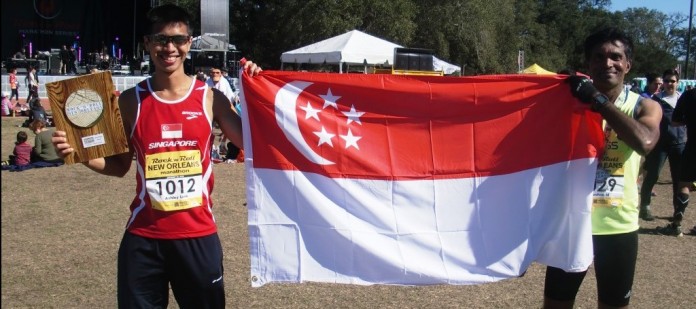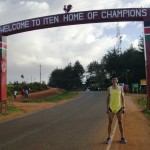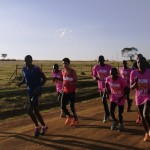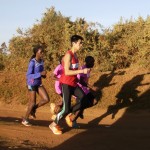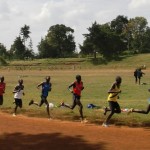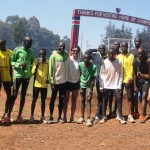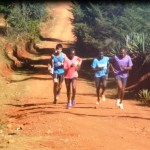Like all other skills in the world, it certainly helps to start running early in life if we wish to become good at it. However, with schools still using running laps as a form of punishment, or simply as warm-up before the fun of games, not all of us are fortunate enough to develop and foster a positive attitude towards running at a young age. It is only later as we get older, that on our own free will, we are re-introduced to, and fall in love with running.
Some runners may lament the lost opportunity of building a solid foundation in those so-called golden years of childhood and adolescence. Yet, it is never too late to start running at any age; in fact, some late-starters go on to become the top of their game. This week, JustRunLah! caught up with Ashley Liew, 2012 winner of the Standard Chartered Marathon Singapore, and a prospective representative for Singapore at the upcoming SEA Games. As our interviewee proves, one’s chronological age when starting is no limitation to becoming one of the best runners in the country.
Read on for more details…
JustRunLah!: Yours is an inspiration story for most late-starters. You didn’t start sports till you were in JC when you ran your first marathon in 2004 as a personal challenge. What started out as a reason for weight loss became a transformation, as you ultimately improved your game over the years, bagging the SCMS win in 2012. Did you ever see yourself being so successful in running?
Ashley: No. I previously considered it a personal success just to finish a marathon. Running was simply a means of losing weight, as well as regaining self-esteem knowing I could better my personal best by 5 to 10 minutes annually from 2004 (4h29m34s) to 2008 (3h34m14s). I was content with where I was. My perspective was completely changed after I met Coach Rameshon Murugiah in December 2008. Beneath my lack of formal training (as well as some flab I still had) he saw a heart of quiet determination. Finishing local runner-up at SCMS 2009 with 2h51m22s was a life-changing moment that made us realize I had more potential. I am blessed to have met gracious souls who have facilitated that expression.
JustRunLah!: You are a marathoner and an Ironman! How have you evolved personally on this journey as a runner and an Ironman? Swim, bike and run, which is your weakest leg?
Ashley: The journey has humble beginnings. When I did my first triathlon, I was so slow on the bike that I had a motorcycle escort accompanying me. By 2010, I had a triathlon bicycle sponsor, made it to two Ironman 70.3 World Championships, and completed my first Ironman. During that Langkawi Ironman 2009 pre-race dinner, a table of “experienced” Singaporean athletes at my table scoffed among themselves in dialect when I told them the time I was going for. I let my legs do the talking on race day. My second and final Ironman in Texas 2012 was my final shot at qualifying for the Hawaii Ironman World Championship. Battling an early bike mishap that affected me throughout the rest of the race, I missed Hawaii but pulled off a time of 10h3m29s (2nd-fastest all-time Singaporean). Throughout my triathlon career my swim was the weakest leg, having to work on my technique almost from scratch. I would be behind in the swim, catch up on the bike, and catch up even more on the run. It was exhilarating coming from behind to do that each time, for it epitomized my life as the underdog. After Texas, I had to make the painful decision to focus on either triathlon or running. I went back to my “roots” with the latter and have no regrets.

JustRunLah!: You recently made a self-funded trip to Kenya for training. How is the running culture and attitude different in Kenya compared to the USA or Singapore?
Ashley: Running is a way of life. The culture of simply being active is moulded from young. Children do not even realize they are running when they join mzungus (Swahili term for white people) for short bursts along the dirt path. They grow up in an environment that celebrates the successes of their neighbour who has been a world champion. I can only say all this of the town of Iten I was in. Iten has a population of 5000, 3000 of which are professional runners! Professional is a euphemism for not having a job, but that is what it takes to be focused and successful. Life is hard there so running cannot be a fringe activity like it is elsewhere. Running offers a glimmer of hope of a way out of the cycle so they give nothing but 100% commitment in workouts, even if it means struggling to finish. While running in South Carolina I often feel I am the odd one out, but in Kenya that title goes to the inactive person. It is like being home! No wonder Iten is a running mecca.
JustRunLah!: What was it like running with the pros?
Ashley: They are gracious to accept mzungus during their runs, even if most of us are in a different league. On occasional workouts they hitch a surprising fast start to throw us off, but it is all good. After all, Kenyan training is based more on feeling and effort rather than strict GPS pace. Then we hang on for dear life. They respect you for finishing a workout, whether you finish with the lead pack or several minutes behind. Imagine the competition with 2999 other runners, yet they respect each other. There are so many training groups that have a sub-2h10m marathoner and you may never realize you are running next to one because they are so humble. I was grateful for their constant encouragement as well, which got me through shared experiences of mental struggle during a fast pace.
JustRunLah!: What were your biggest takeaway lessons from this experience?
Ashley: The debate of nature versus nurture on what makes Kenyans successful is not a debate. The 7850 feet altitude and genetically-endowed lean muscle mass definitely play a role. However, their unparalleled sense of self-belief is the biggest factor in the equation. To quote what my newfound friend Mathew Sutter told me, “life is a struggle of ups and downs but tomorrow will be a good day”. No matter where they are in their running career, each of them wholeheartedly believes they can someday be the best. It sounds almost delusional, but at the top level that is what it takes. As a common Kenyan saying goes, “train hard win easy the Kenyan way”. Self-belief, coupled with the eye of the tiger in training, is my biggest takeaway.


